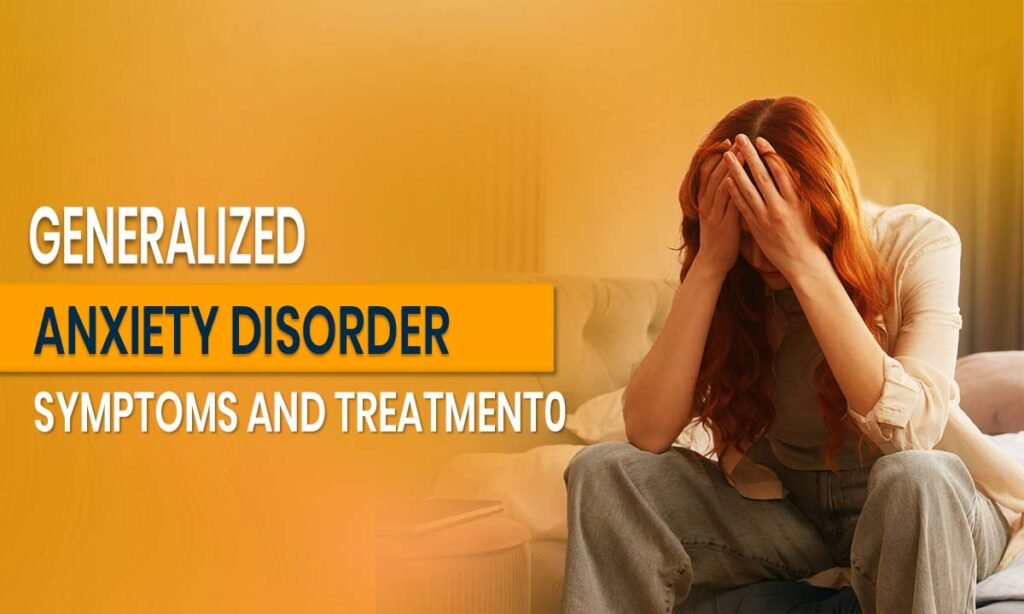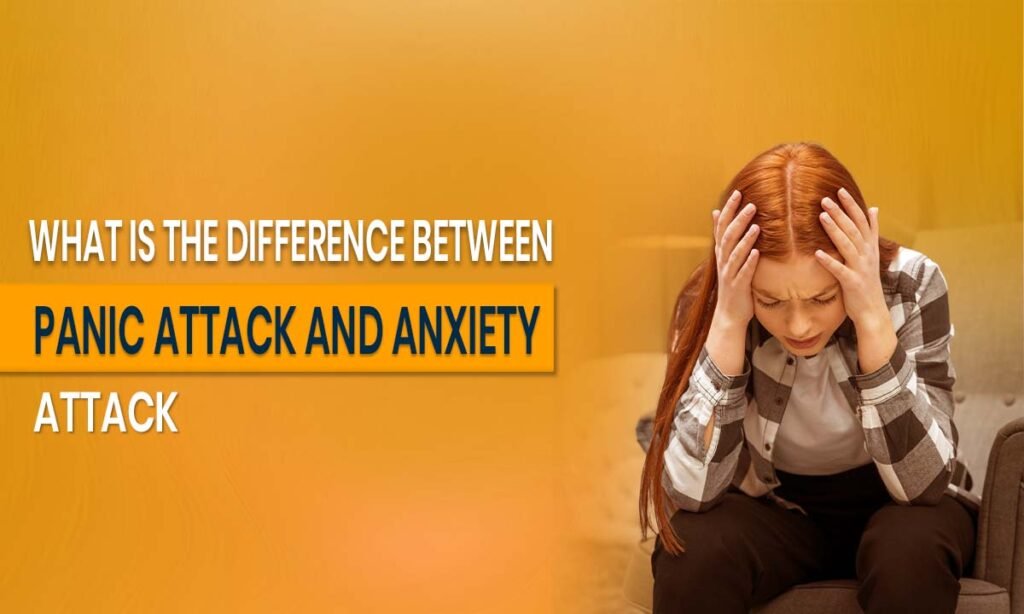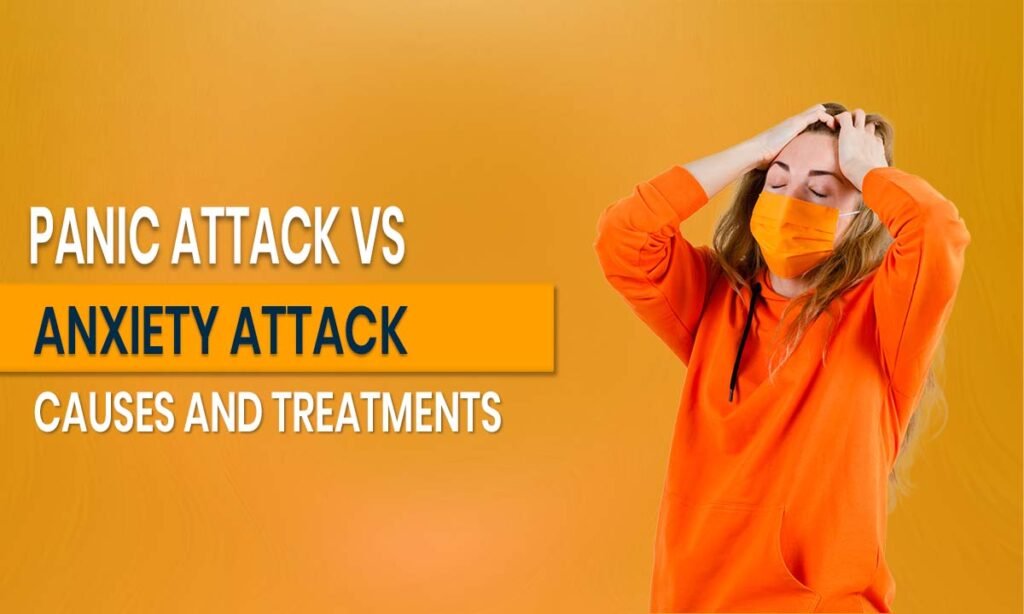
Generalized anxiety disorder is characterized by excessive and uncontrollable worry about various aspects of life, such as health, work, relationships, and daily activities. This worry is often disproportionate to the actual situation and can be challenging to control. Unlike normal anxiety, which goes away when the stressor is gone, GAD lasts longer. It can greatly affect a person’s daily life. People with GAD often expect bad things to happen. They may worry a lot about health, money, family, or work, even when there is little reason to worry.
Table of Contents
ToggleCommon Symptoms of GAD
- Persistent worry or anxiety about different aspects of life. This can lead to overthinking plans and solutions to all possible worst-case scenarios.
- Restlessness and feeling on edge, which can manifest as an inability to relax or feeling keyed up.
- Difficulty concentrating, often described as having your mind go blank.
- Irritability, which may be more noticeable to others than to the individual experiencing it.
- Muscle tension, which can be persistent and manifest in different areas of the body, leading to physical discomfort.
- Sleep disturbances, such as insomnia, which involves trouble falling or staying asleep, or unsatisfying sleep.
- Fatigue, which can be both a symptom of GAD and a result of poor sleep patterns.
These symptoms can vary in intensity and may change over time. It’s not uncommon for individuals to experience periods of increased symptoms and relative relief. Recognizing these symptoms early can help in managing the disorder effectively. Knowing how GAD shows up can help people get help faster. It also allows them to create treatment plans that fit their needs.
What Causes Anxiety?
The exact cause of generalized anxiety disorder isn’t fully understood, but it likely involves a combination of genetic, environmental, and psychological factors. Research suggests that GAD may run in families, indicating a genetic component. Some potential contributors to GAD include
- Genetics: A family history of anxiety disorders can increase the risk. Genetic factors may predispose individuals to develop GAD, but it is usually not inherited in a straightforward manner.
- Brain Chemistry: Imbalances in neurotransmitters such as serotonin and dopamine may play a role. These chemicals are involved in regulating mood and anxiety levels.
- Environmental Stress: Trauma, abuse, or significant life changes can trigger anxiety. Stressful events can act as catalysts for GAD, particularly if a person has a genetic predisposition.
- Personality: Certain personality traits, like perfectionism, may make individuals more prone to anxiety. Individuals who are naturally more timid or have a negative outlook may be more susceptible.
How to Overcome Anxiety
Overcoming anxiety involves a combination of lifestyle changes, self-help strategies, and professional treatment. It’s important to approach anxiety management holistically, addressing both the mind and body. Here are some effective ways to manage anxiety:
Lifestyle Changes
- Exercise Regularly: Physical activity can reduce stress and improve mood. Regular exercise releases endorphins, which are natural mood lifters.
- Healthy Diet: Eating a balanced diet can improve overall well-being. Nutrient-rich foods can provide the energy needed to cope with stress and support overall health.
- Adequate Sleep: Ensure you get enough sleep to help regulate mood and stress levels. Good sleep hygiene includes maintaining a regular sleep schedule and creating a restful environment.
- Limit Alcohol and Caffeine: These substances can increase anxiety symptoms. Reducing intake can help stabilize mood and prevent anxiety spikes. For those looking for support with alcohol-related issues, alcohol detox treatment may be beneficial.
Self-Help Strategies
- Mindfulness and Meditation: Practices that focus on the present moment can reduce anxiety. These techniques encourage a non-judgmental awareness of the present, helping to detach from anxiety-provoking thoughts.
- Deep Breathing Exercises: These can help calm the nervous system. By focusing on slow, deep breaths, individuals can activate the body’s relaxation response.
- Journaling: Writing down thoughts and feelings can provide relief and insight. It can help to externalize worries and gain perspective on them.
- Social Support: Connecting with friends and family can offer emotional support. Having a support system can provide reassurance and a sense of belonging.
How to Reduce Anxiety Immediately
When experiencing acute anxiety or an anxiety attack, the following techniques can provide immediate relief. It’s crucial to have a toolkit of strategies to implement during high-stress moments:- Grounding Techniques: Focus on the present by paying attention to your surroundings and senses. Techniques like the 5-4-3-2-1 exercise can help shift focus away from anxious thoughts.
- Progressive Muscle Relaxation: Tense and relax different muscle groups to release tension. This practice can help increase awareness of physical sensations and promote relaxation.
- Visualization: Picture a calm and serene place to distract from anxious thoughts. Visualization can help transport the mind to a more peaceful state, reducing immediate stress.
Treatment Options for Generalized Anxiety Disorder
Professional treatment for GAD can involve therapy, medication, or a combination of both. Treatment plans should be tailored to the individual’s needs and circumstances. Here are some common approaches:Cognitive Behavioral Therapy (CBT)
CBT is a widely used therapy for anxiety disorders. It focuses on identifying and changing negative thought patterns and behaviors that contribute to anxiety. Through CBT, individuals learn to manage their anxiety by developing healthier thinking and coping strategies. CBT is often structured and goal-oriented, with specific techniques to address particular problems.Medication
In some cases, medication may be prescribed to help manage GAD symptoms. Common medications include:
- Antidepressants: Such as SSRIs (Selective Serotonin Reuptake Inhibitors) and SNRIs (Serotonin-Norepinephrine Reuptake Inhibitors). These medications can help regulate mood and reduce anxiety.
- Benzodiazepines: These are typically used for short-term relief due to the potential for dependency. They can be effective for immediate symptom relief but are generally not recommended for long-term use.
Medication should always be taken under the guidance of a healthcare professional. Regular monitoring by a doctor can help manage side effects and assess the effectiveness of the treatment.
For those struggling with more severe cases of anxiety or additional mental health challenges, such as Drug Addiction Treatment, seeking specialized care may provide relief and healing.Other Therapies
- Acceptance and Commitment Therapy (ACT): Focuses on accepting emotions rather than trying to eliminate them. ACT encourages individuals to live in accordance with their values, despite the presence of anxiety.
- Mindfulness-Based Stress Reduction (MBSR): Combines mindfulness and yoga to reduce stress and anxiety. MBSR helps individuals develop a greater awareness of the present moment and cope more effectively with stress.
How to Control Anxiety Attacks
Controlling anxiety attacks involves both preventative measures and acute management techniques. Preparation and understanding are key to managing these episodes effectively. Here are some strategies:
- Identify Triggers: Understanding what triggers your anxiety can help you prepare and plan coping strategies. Keeping a journal of anxiety episodes can help identify patterns and triggers.
- Create a Coping Plan: Have a list of strategies to use when you feel an anxiety attack starting. This plan can include breathing exercises, grounding techniques, and a list of supportive contacts.
- Practice Regular Relaxation Techniques: Consistent practice can make it easier to manage anxiety when it arises. Techniques like yoga, tai chi, or regular meditation can help maintain a baseline level of calm.
Conclusion
Understanding generalized anxiety disorder and its symptoms is crucial for seeking the right treatment and managing the condition effectively. With the right mix of lifestyle changes, self-help tips, and professional help, people with GAD can live happy lives. Education and awareness are powerful tools in combating the stigma associated with anxiety disorders.
If you or someone you know struggles with anxiety, don’t hesitate to seek help from a mental health professional. Early intervention can make a significant difference in managing anxiety and improving quality of life. Therapists, counselors, and support groups can offer help and understanding, guiding individuals on their path to well-being.
For those in need of specialized care, Athena Luxus in Delhi offers a luxury rehab center that provides a comprehensive, therapeutic approach to mental health recovery, including support for individuals battling anxiety disorders. Their team of experts is dedicated to providing tailored treatment plans that promote lasting well-being and peace of mind.
Patient Experiences
-
Arun Kumar, Delhi: Athena Luxus helped me regain control over my anxiety. The treatments are personalized and effective.”
-
Anjali Verma, Mumbai: “I’m so grateful for the compassionate care at Athena Luxus. My journey with anxiety feels manageable now.”
-
Vikas Sharma, Bangalore: “Athena Luxus’ professional approach and support helped me overcome my anxiety and improve my mental health.”
-
Priya Saini, Chennai: “Thanks to Athena Luxus, I’ve learned how to control my anxiety and live a peaceful life.

